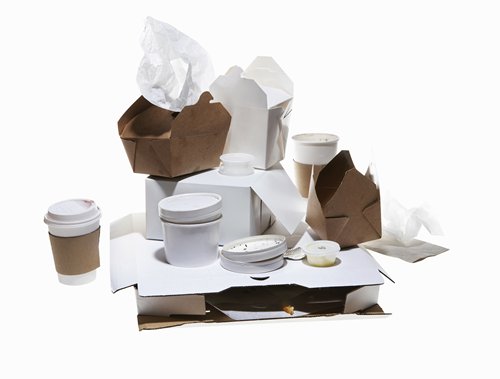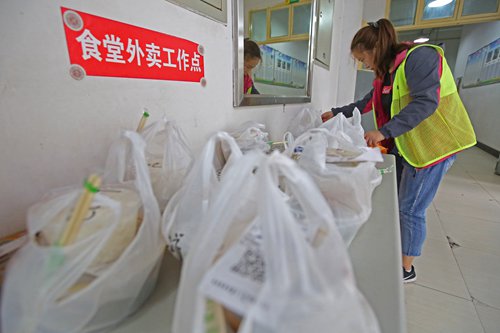
From the People's Daily app.
And this is Story in the Story.
A campaign in China 10 years ago to cut the use of plastics was successful, but it is now being undone by online shopping and food delivery services.
In 2008, China implemented a nationwide ban on free plastic bags in supermarkets, shopping malls and markets. Supermarkets and retail stores started to charge up to 1 yuan for each plastic bag, and as a result, many consumers started taking their own reusable bags when they went shopping.
According to a report by the National Development and Reform Commission in 2013, in five years, the ban on free bags cut consumption of plastic bags by at least 67 billion and saved the equivalent of 1 million metric tons of plastic.
But as e-commerce and food delivery platforms mushroomed in recent years, and as shopping moved largely from offline to online, experts say the ban's focus on brick-and-mortar stores is outdated and they are calling for an upgrade of the regulation 10 years after its implementation.
Today’s Story in the Story looks at how much plastic is used by online shopping and food delivery services.

Photo: VCG
E-commerce is a major area which sees an alarming rise of plastic bag use in China.
An e-commerce package usually consists of a paper box, plastic fillers, a plastic bag and plastic tape to wrap the box. A report by China's State Post Bureau in 2017 showed that in 2016, China's couriers used 14.7 billion plastic bags and 330 million rolls of plastic tape.
"The use of plastic bags by vendors on e-commerce platforms is now a grey area, as the 2008 regulation didn't specify whether plastic bags can be provided for free in online stores,” said Mao Da, founder of Break Free From Plastic China, a non-profit group devoted to the reuse and recycling of plastics.
“Regulations on plastic bags and boxes by food delivery platforms is also a blank area. However, these platforms contribute enormously to the growth of plastic waste in China. The authorities should promptly adjust the regulations and include the platforms in the ban,” Mao said.
More harmful than plastic bags is the rapid growth of single-use plastic boxes and cutlery provided by China's expanding food delivery platforms.
Those platforms and apps have significantly changed the way Chinese people eat. A report by iMedia Research this year shows that in 2017, the total number of users of food delivery apps amounted to 300 million, up 19.1 percent from 2016. More than 200 billion yuan's worth of meals were ordered in 2017. In 2018, that number is expected to reach 243 billion.
According to another report by China's Zero Waste Alliance, a non-profit group that has been promoting waste reduction, Chinese consumers use 40 million plastic boxes each day through various food delivery platforms, which adds up to 14.6 billion plastic boxes a year.

A woman is arranging bags from a food delivery on September 20 in Xi'an, Northwest China's Shaanxi Province. Photo: VCG
Cathy Dong (pseudonym), a 32-year-old office worker in Shanghai says she sometimes receives five to six plastic boxes for a meal she orders. The boxes hold rice, the main dish, soup, sauce and side dishes. "Sometimes I feel guilty for generating so much plastic waste," she said.
Experts say single-use cutlery and boxes used in food delivery will result in huge damage to the environment, and food delivery platforms need to put as much emphasis on environmental protection and social responsibility as they do on pursuing profit.
"Only less than 20 percent of the packaging used by couriers can be recycled, and the plastic components in the packaging, such as fillers and plastic tape, are almost non-recyclable due to their low value," said Zhu Lei, vice director of the Qingdao Institute of Beijing Institute of Graphic Communication. Currently, landfill is the main way to deal with plastic waste.
The issue has alarmed Chinese authorities. On December 17, the State Post Bureau issued a trial regulation on environmental packaging. According to the regulation, the courier industry should standardize, reduce and recycle packages and gradually cut the number of packages.
However, experts still doubt whether these measures will be able to reduce the massive scale of China's food delivery waste problem.
Mao, of Break Free From Plastic China, said food delivery platforms should disclose the amount of plastic waste generated through their platform every day, and set up a target on cutting plastic waste according to their sales revenue.
They can also launch trials to encourage a reduction of plastic waste.
(Produced by Nancy Yan Xu, Brian Lowe, Lance Crayon, and Da Hang. Music by: bensound.com. Text from Global Times.)


